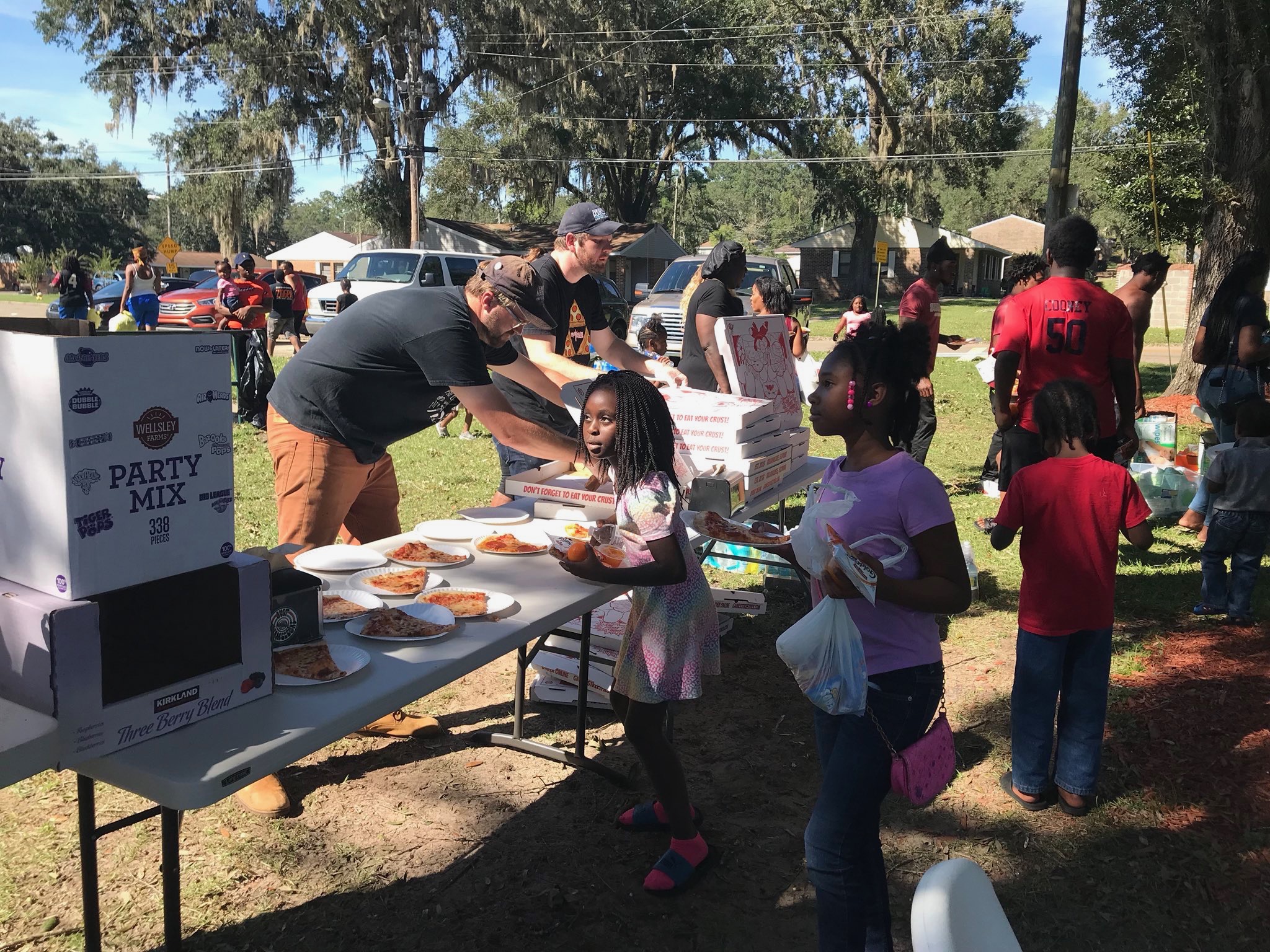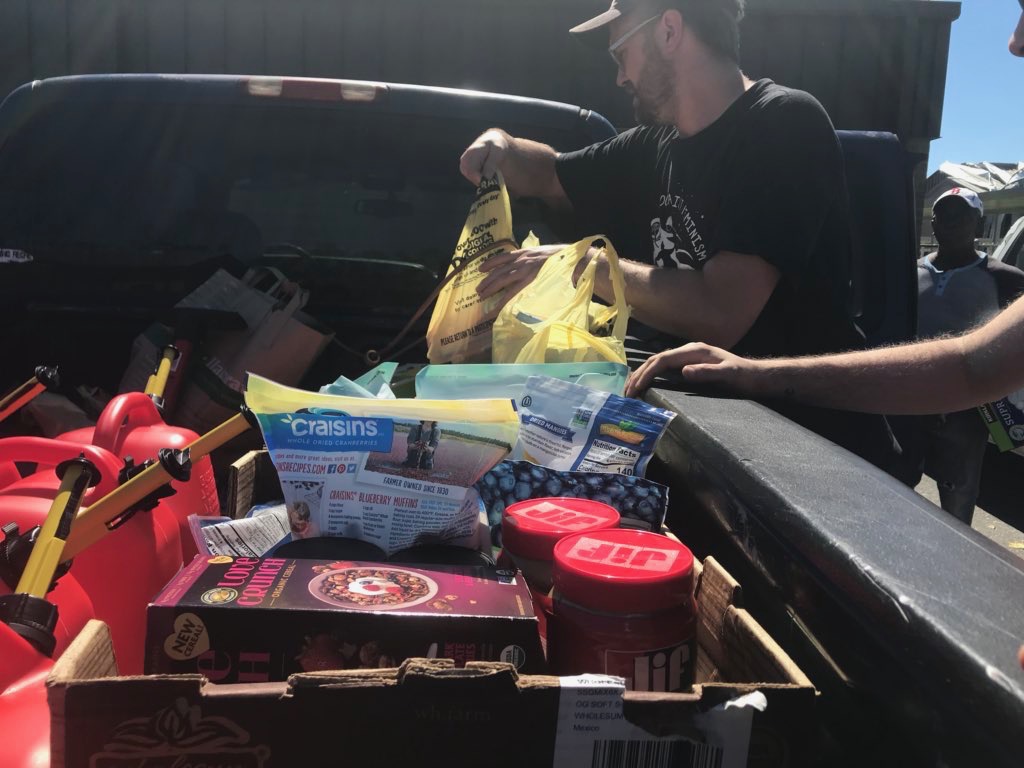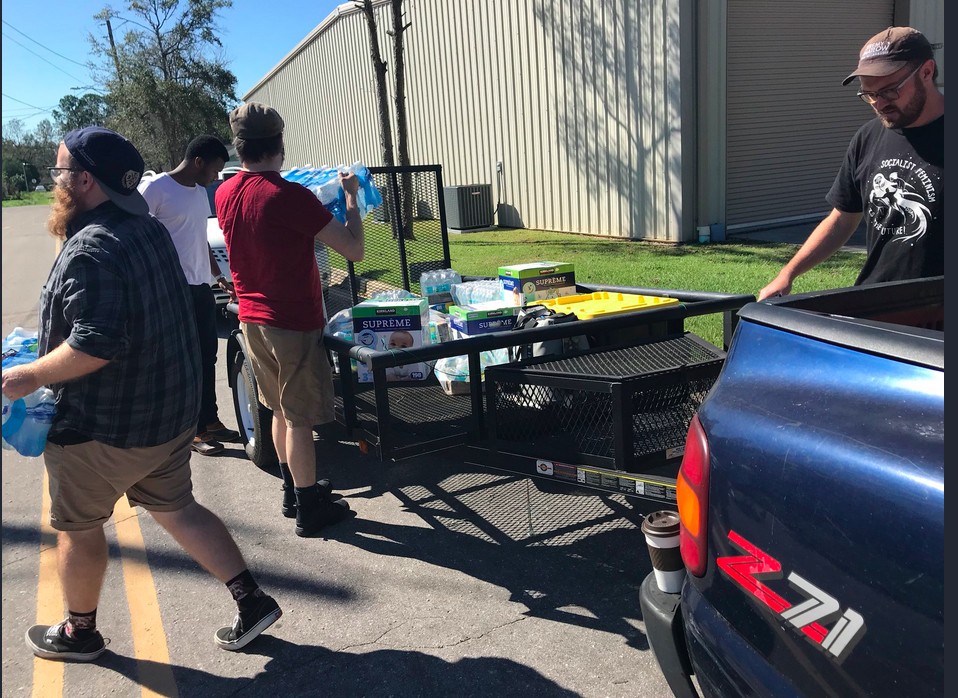Filed under: Anarchist Movement, Capitalism, Community Organizing, Disaster, Environment, Solidarity, Southeast
Members of Mutual Aid Disaster Relief report from the ground in Florida in the wake of Hurricane Michael.
On October 10, 2018, Hurricane Michael swept into the Florida panhandle with a ferocity unlike anything seen in the region’s recorded history. The intensity of the devastation is difficult to overstate, if not impossible. We caught a glimpse of the future this week in the Florida panhandle. And the future is bleak.
Over and over, we found ourselves saying, “We’ve never seen anything like this.” We watched U.S. Customs and Border Patrol hoard food and water in an Altha, FL warehouse swarming with Immigrations and Customs Enforcement agents lying in wait to kidnap and deport undocumented migrants who were desperate enough to seek supplies. We fought through roadways burdened with debris to access rural communities where folks are literally trapped inside their homes without food or water while the Florida police stand around arbitrarily blocking traffic with squad cars, pussyfooting around with their hands in their pockets.
People in Lynn Haven, FL were told they had three days to clear their belongings out of their eviscerated homes in Pinnacle Apartment complex or their remaining belongings would be tossed in the trash. The tenants’ October rent was not returned as they were kicked to the curb. We saw a middle school in Bountstown, FL that had its roof ripped off, strewing yellow, water-logged insulation all across the parking lot. The entry hall to the school had the words “In god we trust” written along its frame, looking over a ransacked foyer of shattered glass, overturned furniture, and broken computers tossed end-over-end by hurricane-force winds. We harbor doubts that the school will ever be rebuilt.
Trees were bent like toothpicks, entire forests reaching to the horizon leveled by tornadoes, snapped cleanly in half in stunning uniformity as if the hand of god had reached down from the heavens to topple them. We looked into the tired eyes set in starving, sun-burnt, haggard faces of people looking for just a single water bottle to quench their thirst.
Homes flattened. Community centers ripped asunder by tornadoes. And all the while not a single FEMA vehicle or distribution center in-sight.
The folks directly impacted by these disasters are often marginalized communities of color and ecological collapse breeds environmental racism. Disaster capitalists take advantage of these communities—as they did in New Orleans and Puerto Rico—turning these traumas into profits. Predators lurk in every corner, seeking ways to benefit from the disaster relief efforts of grassroots organizers. Politicians eager to pose for photo-ops with chainsaws or pizza dinners sit comfortably in homes powered by gas generators while many languish in the heat of the Sunshine State without energy to power their A/C or charge their electronics.
The American Empire is in fierce decline. The global economic system is on the brink of full-scale collapse. We have yet to recover from the ’08 recession and experts predict the next economic crisis is just around the corner. Anthropogenic climate change is currently overturning the apparatuses of neoliberalism, fomenting the rise of full-scale fascism. As capitalist countries and corporations continue to exploit the global south for its resources, arable land shrinks and regions of the planet become inhospitable to human life. The far-right has their response ready: blame the immigrants and refugees, scapegoat people of color, and build an ethnostate devoted to patriarchy and white supremacy.
What will our answer be?
The state is not coming to save you. Capitalists aren’t going to rescue you. We are going to have to help each other. Mutual aid is a factor of evolution. Solidarity, not charity, is our refuge in times such as these.

Hurricane Michael is not a warning, it is a promise. This Category 4 storm reveals the limits of neoliberalism and the perils of our contemporary moment. We sit on a precipice, teetering on the very brink. As anthropogenic climate change accelerates the collapse of state infrastructure, working class and marginalized people are stranded in the mires of dehydration, starvation, addiction, and homelessness.
If we truly believe in the project of creating a better world, then we must possess the humility to shed our ideological purity in efforts to meet the material needs of human beings. We need to get offline and be organizing in the streets, practicing communication that centers those impacted by ecological crisis while simultaneously responding in an egalitarian manner than prizes consensus and snuffs out hierarchy and bureaucracy. Urgency is just as essential as strategy in the midst of these crises. These are just a handful of the lessons we’ve learned mobilizing for disaster relief here on the ground.

I struggle at times to see hope in the future. Often, I think that if we’re being forthright, there’s little to inspire optimism. Anthropogenic climate change is horrifying to behold. We are in the opening moments of a global shift, an epoch maligned by industrial waste and late-stage capitalist excess. Climate change isn’t something that will happen; it is something happening right now. If we are to confront these systems rationally, we must immediately cease speaking of global warming as if it is some event in the future. Rather, it is something we find ourselves at the center of at this very moment.
As the state cedes zones and territory to collapse—as it has in Flint Michigan and in Puerto Rico—we find opportunities to build new forms of community and fellowship in the ashes. We can flee, retreat, abdicate our responsibility to ourselves and to one another. Or we can recognize that it is the obligation of those who have everything to help those who have nothing. The maxim “From each according to their ability; to each according to their need” is not a trite axiom. We must develop robust ways to protect and defend one another if we are to survive.

To that end, consider this an invitation. Get organized. One of the predominant sentiments that community-organizers have returned to time and again in recent days is, “I wish we were more prepared.” Preparation is vital if we are to develop the resiliency to defend our communities from social and ecological crises. Building food kitchens, community-centers, and intersectional organizations is not extraordinarily sexy work—it doesn’t get lots of retweets or shares on the internet. But it will make a difference between whether or not people go hungry.
I do not know if we will win. Some days, if I’m being perfectly honest, I don’t think we will. But we do not fight fascists because we will win. We fight fascists because they are fascist. Our Sisyphian hopes and all our struggles may, in the end, prove futile. But we will love and we will rage. We will create and we will destroy. We will build dual-power in this three-way-fight. And we will do all in our collective power to build a better world in the shell of the old.
Community-organizers on the ground will continue to need your support in the days, weeks, and months ahead. If you cannot come to the Florida panhandle to participate in the ongoing relief efforts, please consider supporting the organizations doing this vital work on the ground.





